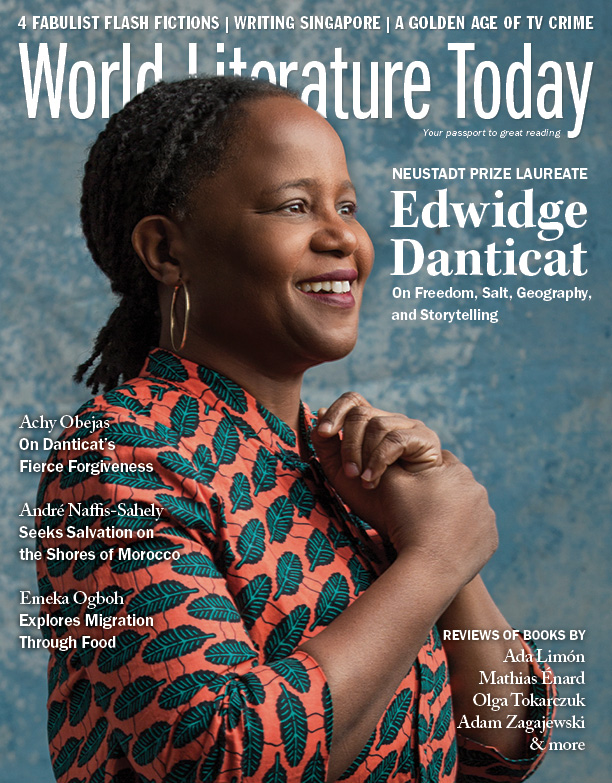God’s Intern

A girl is forced to reexamine the myths surrounding her aunt when her aunt moves in with the family in Texas after leaving her husband in India. Is she more goddess, more witch, or perhaps something else?
Even back then, the myth of Leela Aunty swelled ripe and large.
She was a witch, or so the rumor went. She had seduced her husband not only into marriage but into religious conversion. A dark, knobby girl, no one could understand how else she could have convinced Dr. Rajesh to shed his faith, his family, and his wealth for her. The myth of Leela Aunty went like this: as a student in medical school, Leela had fallen hard for her best friend’s brother. Tall, fair, and handsome. He was Hindu; she was—and remained—very Christian. Their star-crossed romance would have been the stuff of Bollywood films, if only he would pay her any attention. For years, she pined after him. Suddenly, one night, he called her father and asked for her hand in marriage. Before Suma’s grandfather could so much as protest, he offered—quite willingly and, as legend goes, with a pious quiver in his voice—to convert. As far as anyone knew, Leela and Rajesh had never before exchanged words beyond “hello.”
Leela was a whirlwind of gossip and food and prayer, the spokesperson for God himself.
To Suma, Leela Aunty was more goddess than witch. Collectively, Suma had only spent about eighteen hours with her over the course of many visits to India; Leela would swoop in for two-hour time blocks, dramatically scheduled and eagerly anticipated. She was a whirlwind of gossip and food and prayer, the spokesperson for God himself. She would chat with him daily, her hair covered with a dupatta, her palms open and trembling. In turn, he relayed messages to her, messages that she would then pass on to her family in hushed, authoritative tones at the dinner table. When she did this, her eyes would glisten and her perfume would smell darker, damper, as though concocted from womanly secrets.
Once, over fish curry, when Suma was maybe five, maybe six, her father brought up the death of Roy Sir’s son, only twenty-six months old. The toddler had managed to escape the house while his mother napped and had fallen into the deep well in their backyard. Tutting in sympathy, Suma’s father had suggested going over to Roy Sir’s house, perhaps bringing along a padded envelope to help ease their suffering.
“Don’t,” Leela said suddenly. She’d been quiet for most of the meal, rolling her rice and fish curry into balls, arranging her creations in a circle around the plate like a child. “God told me He wanted him to die.”
All six amla-oiled heads turned to her in shock.
That night, as Suma’s mother poured buckets of frigid water over her in the pink-tiled bathroom, Suma asked her if Leela Aunty was evil.
For years afterward, Suma thought of Leela Aunty as God’s incompetent unpaid intern: fumbling his messages, pressing “send” before proofreading the email.
Her mother paused, keeping the red bucket suspended too long, causing the water to burn bitter-cold in Suma’s eyes. “No, mol,” she eventually said. “Sometimes she just mishears what God says. That’s all.” As a result, for years afterward, Suma thought of Leela Aunty as God’s incompetent unpaid intern: fumbling his messages, pressing “send” before proofreading the email.
Suma found out that Leela Aunty was coming to stay with them through the crack in her parents’ door. Her mother’s voice was raised; her father’s was hushed.
“She’s my sister,” he was saying. “We have to.”
“Would you do this for my sister? Even when my father died, you didn’t let my mother live with us. But now, because it’s your sister, we have to?”
“Lincy, be reasonable—”
“You be reasonable!”
Suma sneezed. Her parents quietened.
“Suma mol?” her mother eventually said. “Are you there?”
She crawled quietly into the room. “I was getting water and heard, sorry.”
“Don’t be sorry.” Her mother fixed a slant-eyed glare on her father. “You have nothing to be sorry about.”
Her father sighed. “Suma, you probably heard, but Leela Aunty is coming to stay with us for a bit—”
“Oh, she’s coming? This isn’t even a discussion anymore? She’s just coming?” Suma’s mother scoffed, throwing her hands in the air. “You know what, I don’t even care anymore. Invite whoever you want. Invite your sister, your mother, their dogs. I don’t give a shit.” She left the room, dragging Suma with her by the hand.
The night before Leela Aunty’s flight from Trivandrum, Suma woke up to the pressure cooker whistling at five a.m. She walked into the kitchen, pajama-clad and sleepy-eyed, to find her mother hunched over a flour-dusted counter.
“Sorry, kutta,” her mother said, mopping her shining face with the three-quarter sleeve of her salwar. “Did I wake you up?”
Suma propped her elbows against the flour. There were plates filled with chapattis, pots simmering on the stove. As early as it was, Suma had a feeling that her mother’s preparations had begun much earlier; she smelled vaguely the pungence of mango achar that needed days to ferment.
“No, it’s fine.” Suma picked halfheartedly at the achappams arranged like flowers on a china plate. “I couldn’t sleep much anyway.”
Her mother snorted, then covered it with a cough. “Because you’re so excited about Leela Aunty coming?”
“No, school,” Suma said cautiously. “I have a test in biology today.”
“Oh, don’t worry about that, kuttan,” her mother said. “You’ll do well. You’re clever. You got your brains from your dad’s side of the family.” She stirred the chicken curry so vigorously oil splatters flew up and clung to her eyelashes, defying gravity. “And while you’re at school, I’ll be here. Cooking, cleaning. Cooking more. Because I’m a servant, right? Here to serve your dad and everyone else in the world. This is all I’m good for.” There was a throbbing intensity about her as she whacked a rag on the counter, white flour puffs fogging the slant of her eyes, the tight tremor of her lips.
Suma kept quiet. Her father had told her that, when her mother was in these moods, it was best to let her just talk herself out. It was during these moods that Suma felt a desperate affection for her mother. A deep, silly hope that she feel contentment in her world.
When Suma came home from school that day, Leela Aunty was there on the couch, sipping chaiyya as though she’d lived here forever. She was dressed in Suma’s mother’s ragged salwar, from her slim college days. On Leela Aunty’s bony frame, it draped elegantly. Indian-grunge. She didn’t say “hi” or “hello”; she didn’t get up from her seat. Instead, she beckoned Suma over with one finger. “Suma kutty,” she said, when Suma gingerly drew closer. “You’ve gotten so big. God bless you, mol.” She put a hand on Suma’s hair, fizzing and frizzing it with static. Her voice was low, her lips were red, her eyes were rimmed in darkness.
Suma felt a strange energy from Leela Aunty’s touch, as though she truly had been blessed by the man in the sky. As though, perhaps, she wanted to be blessed by the man in the sky. She mumbled a hello, and Leela Aunty patted the cushion beside her as though she owned it. They sat there, in silence—Suma’s awkward, Leela’s somber—until Suma’s mother called them in for dinner.
It was at dinner, when Leela Aunty changed into pajamas and took off the dupatta that had been covering her neck, that Suma noticed the light purple ring accessorizing her throat like a choker. Leela Aunty answered questions about her work (she was a doctor), Rajesh’s work (he was a doctor), and their life (religion). She did not talk about the ring—not the one present on her neck, nor the one absent from her finger.
It wasn’t long before the rumors started flying. This time, it wasn’t witchcraft; it was worse.
It wasn’t long before the rumors started flying. Suma couldn’t have ignored them even if she’d wanted to. This time, it wasn’t witchcraft; it was worse.
At school, Suma’s friend told her, “My mother heard from her sister who’s friends with your uncle’s sister”—roughly, this translated to a story that Rajesh’s sister, Roma, was spreading—“the real reason why your aunt and uncle got married. And the real reason why she left.”
“Why?” Suma asked, but her friend walked away, tossing a giggly “Ask your aunt!” behind her.
“Oh, Roma,” Leela Aunty said when Suma asked. She rolled her eyes. “Roma used to be my best friend. Until she went crazy. Have I ever told you that story?”
Suma felt her breath fog her throat. “No, you haven’t.”
“Well,” Leela Aunty began, and her eyes glittered. “It all started in medical school. You know that Roma is Rajesh’s sister, right? We lived together in our college hostel, and I met Rajesh through her. He was two years older than us. The night we met, I had a dream—a vision. From God.”
“From God?”
“Of course, from God. Who else? He is first and foremost. Above all else. He, no one else, told me that Rajesh was meant to be my husband. I saw, in the dream, that Rajesh would receive three signs that would show him the truth as well. A mango would fall on his head, an autorickshaw would honk at him in the street, and finally, a priest would explicitly tell him God’s plan.”
“And?”
“And, what do you think? We got married, didn’t we? All three signs came to be.”
Suma couldn’t help her gasp.
“Are you surprised?” Leela Aunty laughed, deep in her throat. Her eyes glittered. “Never doubt God’s plan, mol. You’ll find that out yourself soon enough.”
There was a sudden heat in Suma’s mind. “Wait,” she remembered. “How does Roma fit into this? What did she do?”
“Oh.” Leela Aunty waved a hand in front of her face, as if Roma were a bad smell to waft away. “She was, well, a ‘dusky beauty’”—she drew air quotes around the phrase—“who, having no love affairs of her own, lived vicariously through mine. I wrote a letter to Rajesh, explaining the dream and the three signs he would see. Roma just delivered the letter. She didn’t know what was in it.”
Suma slumped back into her chair, barely noticing the steel digging into her back. “Wow. I wonder what she’s saying about you, then?”
“Some nonsense, to be sure,” Leela Aunty said. She laughed again. “She was always making up things. She had such a crazy imagination.”
At school, Suma made sure to tell her friend the truth. God’s truth. Her friend rolled her eyes and said, “You’re so wrong. It was blackmail. Your aunt blackmailed your uncle into marrying her.”
Suma rolled her eyes right back. “And you know my aunt better than I do, right? Anyway, you just don’t understand God’s plan.” She was the one to walk off this time, a righteous swagger in her step.
The murmurs didn’t stop there. Over the course of the year that Leela Aunty stayed with them, Suma heard that she was an alcoholic, that she was a gold digger, that she had refused to sleep with Rajesh and give him any children. Leela Aunty heard all this as well but pretended she didn’t. She closed her eyes and hummed Christian hymns. She volunteered at the Mar Thoma church that Suma’s family had an aesthetic membership to. She organized clothing drives for homeless people and then tried to convert them. She kept busy, in other words.
It was on a Sunday about eight months into Leela Aunty’s stay that Suma’s father stopped her from accompanying Leela Aunty to church.
“Just—not today, okay?” he said.
“Why?” Suma protested. She had tagged along with Leela Aunty to church for the past few months and found herself looking forward to Sunday throughout the week. While she hated the Mar Thoma services her family had forced her to attend when she was much younger, she found Leela Aunty’s born-again Baptist church thrilling. People threw their hands in the air, flaunting their sweat stains to the world. They shouted “Hallelujah!” whenever they felt like it; they sang off-key and hoarsely at the top of their lungs. Women writhed on the floor, speaking tongues and spewing secrets. The services filled Suma with adrenaline, with static crackling in her stomach. She began to understand what Leela Aunty meant when she spoke of building “a relationship with God.” Every Sunday she would joke with Leela Aunty, “Hey, say ‘hi’ to God for me, since you two have such a great relationship.” Every Sunday, Leela Aunty would respond, “Tell him yourself.”
“Because I have something to tell you.” Suma’s father rubbed the back of his neck, and that’s how she knew he was serious. She stayed back, regretfully taking off the dress Leela Aunty had bought for her, the flouncy one with cloth roses studded on a scarlet-velvet belt.
“Listen, your Amma and I are a bit worried that you’re getting too involved with Leela Aunty’s church,” Suma’s father said, once he’d sat her down in the manner that let Suma know she was about to receive a Talking To. “It’s great to explore your faith, but Leela Aunty’s church is a bit, well . . . radical, for our tastes. If you really want to go to church, Amma and I will take you to Immanuel.”
“No!” Suma jumped up. “Immanuel is so boring, Appa, and church isn’t supposed to be boring. It’s supposed to be an experience! It’s supposed to fill you with the spirit of Christ—”
“What bullshit,” Suma’s father scoffed, before holding up his hands in apology. “I mean . . . we, personally, as a family, don’t believe that, Suma.”
“Appa, you don’t understand. Leela Aunty really talks to God.”
“She does not talk to God.”
“She does!” Suma leaned in, beckoning her father closer with one finger. “Do you know the story of how she met Rajesh Uncle?”
Suma’s father made a noise like he was being strangled. He coughed, four times. Suma whacked him on the back until he managed to croak, “What did she tell you about that?”
Suma had been practicing her low, deep tone of secret-telling and eagerly relayed Leela Aunty’s story to her father, who responded by coughing some more. Then he told her a slightly different version:
Leela was honest in that the gist of her letter, written in blue ink on pink stationery, was this: In a dream, God told Leela Aunty that she was meant to marry Rajesh. However, the versions differed from here. Although a devout believer, Leela Aunty nevertheless couldn’t leave these signs entirely in God’s eminently capable—but, to be honest, quite busy and maybe a smidge absentminded—hands. Instead, she slipped a street urchin a hundred-rupee note to hide in a nearby mango tree and drop fruit at opportune moments. The driver of the rickshaw she just happened to climb in the moment Rajesh left his office was forced to stop and honk when she screamed that a mosquito landed on his wheel. She politely requested that her friend, a born-again Christian with evangelical proclivities, practice the spiel he’d prepared for his imminent South Africa missionary trip on Rajesh, who was of course very aware of the rehearsal.
“And before you ask,” Suma’s father concluded, “I know this because she told me herself. She laughed when she told me, too. Back then, she wasn’t very religious at all. She didn’t even come with Ammachy to church—well, maybe sometimes, on Christmas or something. But she became this way after Rajesh. It was all just a crazy scheme that went wrong. Her imagination is too wild, Suma. Like yours. Religion was dangerous for Leela, and I think it is for you as well. We just want to keep you safe.”
Suma couldn’t breathe. A damp voice was whispering at her ear, but she fought hard to ignore it. It was as though something nebulous inside her had finally been named. The room bulged with silence.
Over the next few weeks, Leela Aunty became quieter. She stopped holding Suma’s hand and praying with her at bedtime anymore. She stopped giving divine updates over dosas. The violet marks faded from her neck, so she stopped wearing scarves in the Texas heat. One night, Suma heard her talking on the phone when everyone else in the house was asleep, when it was morning in India. She wasn’t exactly sure what was happening, but it sounded to her as though Leela Aunty was losing and winning the conversation at the same time. She said she didn’t want to come back to India; she said she was fine alone. She said she was happy. Then she put down the phone and cried until Suma fell asleep to her sobs.
Eventually, Leela Aunty’s J-1 work visa came through, and, although she hadn’t passed her USMLE exams to practice medicine in the States, she got a job as a physical therapist at a nearby hospital. With her salary and some help from Suma’s father, she was able to afford a small apartment just a few miles away. On the day she moved out, wheeling with her two black suitcases that held all her worldly belongings, Suma fought back tears.
“Hey, Leela Aunty, say ‘hi’ to God for me,” she said.
“Oh, well—” Leela Aunty’s voice was high and shrill. “God and I—we don’t talk so much anymore.”
Atlanta, Georgia
Read two poems by Namrata Verghese from this same issue.












